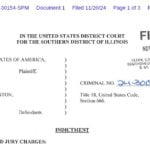Carlinville, IL. (ECWd) –
In their quest to continue with a regional water concept, the City of Carlinville appointed an Alderman to an alleged regional water board to look at options. The option they have apparently decided to take is not an option they have the statutory authority to take. In other words, the City of Carlinville lacks the statutory authority to form and participate in a regional water private non-profit corporation.
This purported private corporation involves Carlinville (municipality), Jersey County Rural Water Company (private non-profit) and the Fosterburg Water District (read about this watering hole). A Water District does not have this statutory power either.
Does a Municipality have authority to establish a Non-Profit for a water supply?
The short answer is NO, but we will explain it below.
For any local government in Illinois to do anything, it must first have been granted authority by the legislature (with certain exceptions for home-rule units). This authority derives from the Illinois Constitution and the Illinois Compiled Statutes. This is known as Dillon’s Rule, named after Iowa Supreme Court Justice John Forrest Dillon.
Essentially, Dillon’s Rule states that governments only have the express powers given to them in the statutes (and the indispensable powers to accomplish the given powers), no matter how much it is wanted or needed, if there is no statutory authority granted to perform the act, it cannot be performed. If there is any reasonable doubt as to whether a government can perform a function, it cannot perform it (the government does not receive the benefit of the doubt). The government has all powers indispensable to those granted in the statute.
Do not confuse Dillon’s Rule as looking for a statute prohibiting an action – instead, you must look for a statute enabling the action.
What powers does a Municipality have when dealing with a supply of water?
Article 11, Division 124 of the Illinois Municipal Code spells out the powers given to municipalities when dealing with drinking water.
- 65 ILCS 5/11-124 grants power to contract for water – and no power to borrow under this section.
- 65 ILCS 5/11-125 grant power to construct water system – includes the power to levy a tax.
- 65 ILCS 5/11-126 granted power to jointly construct water system – by constructing their own, jointly constructing one with an adjacent municipality, or by purchasing one from an adjacent municipality already having a water supply – can borrow and tax under this section.
- 65 ILCS 5/11-127 granted power to purchase or lease waterworks – back-door referendum eligible – can borrow and tax under this section.
- 65 ILCS 5/11-128 granted power to levy a tax, subject to referendum, for waterworks – may borrow and bond under this section – may form a joint water district with adjacent municipalities.
- 65 ILCS 5/11-129 granted power to build, purchase, or operate waterworks – may bond, borrow, obtain grant – may be subject to backdoor referendum – must establish and appoint a 3 to 7-member municipal water board who have exclusive control of the water funds
- 65 ILCS 5/11-130 granted power to construct and purchase waterworks – the power to bond.
- 65 ILCS 5/11-132 explains they may seek a better source of water, but only thru ownership, or lease, and doing this only out of the surplus earnings of the city’s waterworks – unless approved by ballot referendum.
- 65 ILCS 5/11-135 granted power for joint acquisition and operation of waterworks between 2 or more municipalities – this establishes a County Water Commission – the power to bond, have intergovernmental police agreements (for the water commission purpose), and other IGAs with any other local government for water commission purpose.
- 65 ILCS 5/11-136 similar to above paragraph but also includes sewer systems and uses the term “Water and Sewer Commission” as part of its name.
- 65 ILCS 5/11-137 power to contract, purchase, or lease for the supply of water – subject to backdoor referendum – municipality can resubmit every 6 months – the power to borrow and bond.
- 65 ILCS 5/11-138 a (private) water company organized to supply water to a municipality may locate and relocate no more than 20 miles from municipality.
- Other powers granted but not applicable.
What powers does a Municipality NOT have?
- Among many others, a Municipality was never given the power to create or participate in the creation of a non-profit water corporation in order to contract for water. Therefore, it does not possess the power.
- The powers granted by the legislature, include all powers a municipality possesses in order to supply water to its residents – and no other powers are granted.
The City of Carlinville, or any other municipality in Illinois, does not possess the powers to create a private non-profit or to participate in the creation of a private non-profit, in order to contract for water from it.
Contracting for water does not equal setting up a private corporation for the purposes of contracting for water.
What should Carlinville do, if they must do anything?
- Participate in Water Commission (which is a public body)
- Use Intergovernmental Agreements to form a Water “Consortium” or a Municipal Joint Action Water Agency (which would be a public body)
What are the real issues with forming this private nonprofit?
- No accountability to residents
- No accountability in contracting
- No accountability in hiring
- No accountability in use of public funds
- No way for residents of City of Carlinville or the Fosterburg Water District to maintain control
- No statutory requirements for Open Meetings
- Limited statutory requirements under Freedom of Information Act
- No control over water rates








2 Comments
J.E.
Posted at 09:02h, 05 NovemberIt seems like a regional water cooperative that is bereft of crony capitalism would be a positive development for all residents affected, but why be so secretive and crony about it? There is much more to this than meets the eye. I’ve long thought that local power and water cooperatives would be a powerful balance against the elitists. It is shameful that they usurp our communities of the wealth generated by the very utilities that power our homes and our businesses. For the first time in a long time technology is enabling us to fight back and take back what is rightfully ours. We all must seize the moment and find our common bonds. While I don’t agree with everything you say, I am very appreciative of everything you do to help bring awareness.
jmkraft
Posted at 09:07h, 05 NovemberIt could be a benefit if they would follow the law when setting it up. Like forming a Water Commission, or use Intergovernmental Agreements to form it – but those options cannot include the Jersey County Rural Water Company because it is not a public body. There is a reason Jersey Rural Water has been spearheading this project…and it is not in the best interest of the municipalities and water districts.